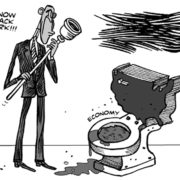And just like that, the highly-anticipated 2012 US presidential elections is finally over.
In what turned out to be one of the closest and costliest presidential races in history, President Barack Hussein Obama secured a second-term, snatching the gilded seat of chief executive away from Gov. Mitt Romney by almost a hundred electoral votes.
At the announcement of his victory, Obama already had 303 electoral votes (with only 270 needed to win), while Romney was at 206.
Examiner.com predicts that after all the electoral votes have been accounted for, Obama would most likely win by 126 votes, at 332.
On Thursday afternoon, Romney finally conceded that Obama won Florida, despite a close race in the Sunshine state.
Meanwhile, the nation is still counting ballots for the popular vote, with late Wednesday’s tallies placing Obama at a comfortable lead: 60,367,866 (or 50.4 percent) versus Romney’s 57,572,736 (or 48.1 percent) votes.
But Pres. Obama barely has time to dwell on the afterglow of his victory. To make up for an underwhelming first term, Pres. Obama needs to roll up his sleeves and start working at Day One of his second term.
On Obama’s first day as re-elected president, the stock market went on a major nosedive, dropping 313 points (or 2.36 percent) “on fears over the looming US fiscal cliff and new European economic woes,” as reported by Fox News.
Ironically, just a day before the presidential elections, the stock market “managed slight gains in thin trading,” with the Dow Jones industrial average gaining 19.28 points at the start of the week and closing at 13,112.44 on Monday, reported the Associated Press.
Market watchers speculated that it can be partly blamed on the incumbent’s re-election, running on a platform which increases taxes on the wealthy and capital gains taxes and taxes on dividends.
“If such policies were to go into effect, they would most likely depress asset values. Some investors were hoping that a more business-friendly Mitt Romney would be elected, and optimism for that outcome helped drive a stock market rally on Election Day,” says Christopher Matthews of TIME Magazine.
CNBC host Jim Cramer said that the close race was responsible for attracting investors to buy shares in financial institutions (as well as coal companies), banking on Romney’s campaign promise of easing environmental regulations and of rolling back the Dodd-Frank financial reform bill.
However, according to investors, the crux of the sharp decline is “the looming austerity measures that are set to go into effect at the end of the year. Current law dictates that the Bush tax cuts for all taxpayers will expire, as will the temporary payroll tax cut which was extended by President Obama and Congress in 2011. In addition, a round of cuts in military and so-called discretionary spending will begin in January,” says Matthews.
The gridlock in Congress has been ongoing since last year, brought about by the Republicans’ refusal to increase taxes across the board, while Democrats push for a tax increase on American households with a $250,000 income or more.
Should the gridlock in Congress between Republicans and Democrats remain unresolved, economists predict that the GDP will lose as much as 4 percentage points in 2013 — a detriment which could trigger another recession for the country.
And it will not only hurt the deep pockets of the wealthy. A study released by the Tax Policy Center in October revealed that the failure of lawmakers to renew a lengthy roster of tax cuts could affect taxpayers across the income spectrum, hitting them with large tax hikes, said the Associated Press.
To illustrate, a middle-income household earning $40,000 to $64,000 a year could see their taxes go up by $2,000; households at the top one percent income range could see an average tax increase of more than $120,000, while a household income between $110,000 to $140,000 could see a tax hike in the $6,000 range,AP reported further.
While the gridlock is not Pres. Obama’s fault, he plays a crucial role in bipartisan relations. The country is facing a dire situation and time is seriously running out.
Republican House Speaker John Boehner has offered to work with Pres. Obama on a compromise deal that will include higher taxes “under the right conditions.”
House Republicans are asking Pres. Obama “to make good on a balanced approach,” which would include spending cuts and addressing government social benefit programs.
Boehner said that conditions on higher taxes “would include a revamped tax code to make it cleaner and fairer, with fewer loopholes and lower rates for all,” said AP.
However, “reaching across the aisle” goes beyond securing bipartisanship in Congress.
Calvin Woodward of the Associated Press gives this insightful observation: “The election laid bare a dual – and dueling – nation, politically speaking, jaggedly split down the middle on the presidency and torn over much else.”
“After the most ideologically polarized election in years, Obama’s assertion Wednesday morning that America is ‘more than a collection of red states and blue states’ was more of an aspiration than a snapshot of where the country stands,” Woodward further wrote.
While 48.1 percent of dissatisfied American voters are still grieving over Romney’s loss, at this juncture, everyone (whether leaning left, right or center) is holding on to Pres. Obama’s words in his victory speech — that the “best is yet to come” for America.
Hopefully, it will be sooner than later.
(AJPress)







